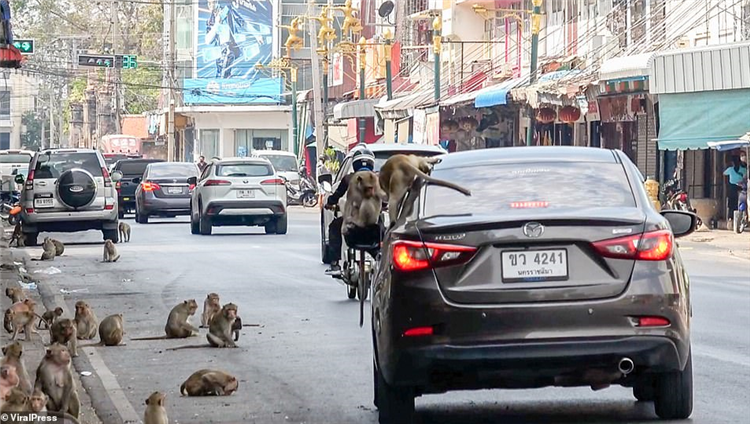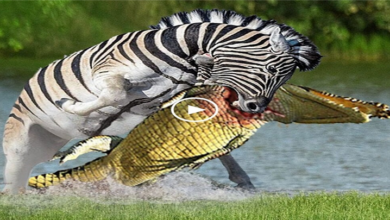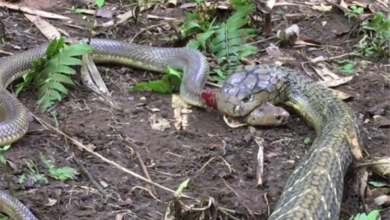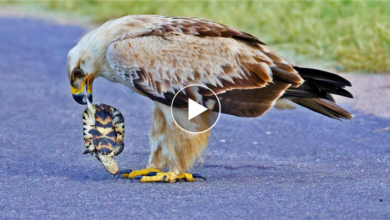A Thai community is terrorized by thousands of monkeys: After being addicted to sugary drinks, rival gangs engage in a war for supremacy while competing for food, even climbing on people and vehicles.

Hordes of rampaging wild monkeys have been terrorising a town in Thailand as they become hooked on sugary drinks while waffling down bananas.
The town of Lopburi, around 90 miles north of the capital Bangkok, is well-known for its monkey population which brings tourists from around the world, with locals even holding an annual festival to honour the primates.
But since tourists began to return to Thailand after coronavirus restrictions were eased in November, Lopburi’s monkeys – whose numbers multiplied considerably during the pandemic – have enjoyed much greater access to sugar-filled snacks and drinks.

Now, the streets of the city are ravaged by thousands of the sugar fuelled macaques, who compete violently for food and territory.
Footage taken on Tuesday shows dozens of animals roaming the streets, jumping on cars, climbing on humans and even stealing their food and belongings.
The startling video shows locals handing out plastic tubes filled with sugar and syrup and the monkeys can be seen sucking them dry before going after a man handing out bananas.

Their total lack of fear for humans means monkeys exhibit extremely bold behaviour, clambering across the windshields of moving vehicles and jumping all over bystanders in the street.
Locals say there are even rival gangs that mark their territory – resulting in clashes when the animals meet.
Government officials have tried to control the wild monkey population in recent years but have been unable to curb the numbers as the animals continue to multiply.

Large numbers of monkeys were sterilised in 2020 as part of a government programme after their numbers spiralled out of control during the pandemic.
Wildlife department officers lured the animals into cages with fruit and take them to a clinic where they were anaesthetised, sterilised and left with a tattoo to mark their neutering – but the authorities simply can’t keep up.
The coronavirus lockdowns gave the macaques even more space to roam freely around the city and the surrounding area, and with well-meaning locals keeping them fed in the absence of tourists, the population exploded.

Environmental officer Narongporn Daudduem said the department has a long-term plan to build a sanctuary in another part of the city but plans are likely be met with resistance from some of the residents who don’t want the primates living near them.
‘We need to do a survey of the people living in the area first,’ said Narongporn Daudduem from the wildlife department.
‘It’s like dumping garbage in front of their houses and asking them if they’re happy or not.’

Supakarn Kaewchot, a government veterinarian, said: ‘The monkeys are so used to having tourists feed them and the city provides no space for them to fend for themselves.
‘With the tourists gone, they’ve been more aggressive, fighting humans for food to survive. They’re invading buildings and forcing locals to flee their homes.’
Though the city of Lopburi is famous for its monkey population and many of the locals are grateful for the tourist exposure they bring, there have been several incidents in recent years in which the animals have wreaked havoc.

In March 2020, the monkeys engaged in an astonishing mass brawl over scraps of food as Thailand was plunged into lockdown, with the sudden drop in tourism – and consequently availability of food – made the macaques violent and erratic.
Locals took to feeding the macaques with cheap fast-food to prevent the violent clashes, but this only gave the monkeys more energy and caused them to breed even faster.
Entire blocks of the city quickly became off-limits to humans as the primates took over and defended their territory violently, with one abandoned cinema serving as the macaques’ base and cemetery.

Dead monkeys were laid to rest by their peers in the cinema’s projection room, and at the time locals said that anyone who attempted to enter was attacked.
Meanwhile, in February last year dozens of monkeys took over a school’s swimming pool and rummaged through the bins in search of food.
During coronavirus lockdowns, the macaques began to enter deserted buildings and ruins to shelter and begin breeding.

But over time, they became more bold and started to invade both public and private venues such as shops, restaurants, cinemas and schools, sometimes with hordes of the creatures overrunning the premises.
Many congregate around an ancient Buddhist temple but they have also taken over a cinema – forcing the previous owner to move out and close the business.
‘The more they eat, the more energy they have… so they breed more,’ says Pramot Ketampai, who manages the Prang Sam Yod temple’s surrounding shrines.

No one in Lopburi seems to remember a time without the monkeys, with some speculating that the urban creep into nearby forest drew the simians into the city.
However, there are some locals who, despite having to take measures to ward the primates away from their homes and businesses, enjoy their company.

Taweesak Srisaguan, a shop owner in Lopburi who uses stuffed animals as a deterrent to the unwanted monkey visitors, says that despite his daily joust with the creatures, he will miss them if they are moved.
‘I’m used to seeing them walking around, playing on the street,’ he says.
‘If they’re all gone, I’d definitely be lonely.’





